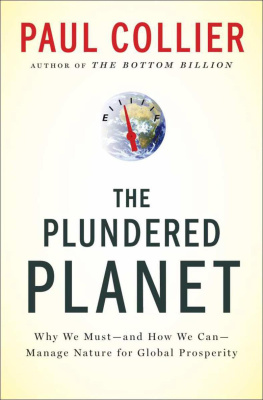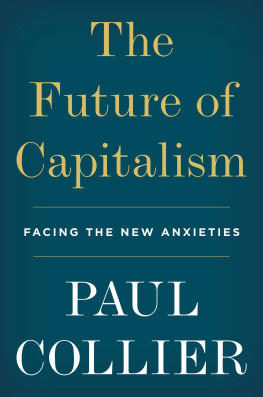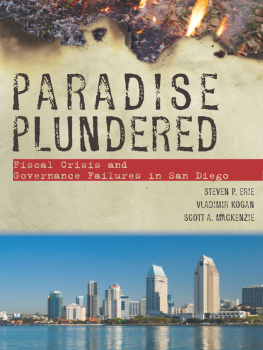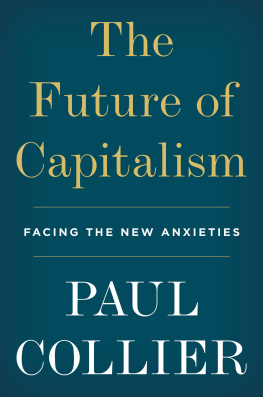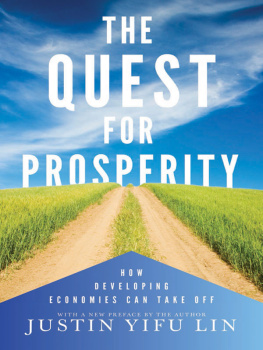THE PLUNDERED PLANET
Also by Paul Collier
Wars, Guns, and Votes: Democracy in Dangerous Places
The Bottom Billion: Why the Poorest Countries Are Failing and What Can
Be Done About It
The Plundered Planet
Why We Mustand How We Can Manage Nature for Global Prosperity
PAUL COLLIER


Oxford University Press, Inc., publishes works that further Oxford Universitys objective of excellence in research, scholarship, and education.
Oxford New York
Auckland Cape Town Dar es Salaam Hong Kong Karachi Kuala Lumpur Madrid Melbourne Mexico City Nairobi New Delhi Shanghai Taipei Toronto
With offices in
Argentina Austria Brazil Chile Czech Republic France Greece Guatemala Hungary Italy Japan Poland Portugal Singapore South Korea Switzerland Thailand Turkey Ukraine Vietnam
Copyright 2010 by Paul Collier
Published by Oxford University Press, Inc.
198 Madison Avenue, New York, New York 10016
www.oup.com
Oxford is a registered trademark of Oxford University Press
All rights reserved. No part of this publication may be reproduced, stored in a retrieval system, or transmitted, in any form or by any means, electronic, mechanical, photocopying, recording, or otherwise, without the prior permission of Oxford University Press.
Library of Congress Cataloging-in-Publication Data Collier, Paul.
The plundered planet : why we mustand how we can manage nature for global prosperity / Paul Collier.
p. cm.
Includes index.
ISBN 978-0-19-539525-9
1. Natural resourcesManagement.
2. Sustainable development.
I. Title.
HC85.C656 2010
333.7dc22 2009047333
1 3 5 7 9 8 6 4 2
Printed in the United States of America on acid-free paper
For Stephanie (aged one) and Alexander (aged three), who will inherit the natural assets and liabilities that we bequeath, and who already know a thing or two about natural disorder.
Contents
Preface
I GREW UP BEFORE NATURE WAS DISCOVERED. Today, our mismanagement of the natural world is widely recognized. It fills blogs and packs conferences, and environmental studies sits high and proud in the school curriculum. But when I was at school it was called nature study, and we slept through it. At college, while others were waking up to disorder in the natural world, I woke up to global poverty and the tragedy of frustrated lives. My parents had lacked the opportunities that had opened for me. I saw in global poverty that same lack of opportunity writ large.
Environmentalism looked like the indulgence of people who took their prosperity for granted. Restoring environmental order and eradicating global poverty have become the two defining challenges of our era. Each has its adherents, often opposed. A number of environmentalists in the developed world are wary of the spread of global prosperity, arguing that it would wreck the planet. Conversely, in the poorer countries of the worldthe bottom billionmany people are wary of environmentalism, seeing it as an attempt by the richer countries to haul up the ladder. Belatedly, I have accepted the importance of nature. This book reflects my own struggle to reconcile the quest for global prosperity with an ethical approach to the natural world. As Nicholas Stern argues, if we fail in either challenge, we fail in both. If we permit natural disorder to continue, it will indeed frustrate the eradication of global poverty. Yet if part of the world continues to be marginalized, it will frustrate the cooperation on which the restoration of natural order depends. The two goals are linked by something even more powerful than this threat of shared failure. Nature is the key asset of the poorest countries: managed responsibly it will power their ascent to prosperity. Yet the scramble for prosperity is driving the plunder of nature. Natural orderthe responsible management of naturecan deliver prosperity, but prosperity alone cannot deliver natural order.
The tension between prosperity and plunder is now apparent. The worlds voracious demand for raw materials has driven up the prices of natural resources and food to unprecedented levels; it took a global financial crisis to puncture them. In turn, the price hike has triggered a new scramble for Africa, pumping revenues into the continent. China, the giant of the emerging market economies, comes without the baggage of colonialism; indeed, many of the countries of the bottom billion have long regarded it as an ally. But from the perspective of the rich countries, the Chinese arrival in Africa is not just unwelcome competition. It threatens to undermine international efforts to reform the governance of the extractive industries, after decades of corruption and exploitation. The Chinese president has toured Africa with the message we wont ask any questions. Is China finally freeing the bottom billion from the lingering embrace of colonialism or plunging them back into a shameful past?
While abroad the emerging market economies buy up resources, at home their industries emit carbon dioxide. For the next twenty years China plans to construct more power stations annually than the entire British stock. The carbon threatens to overheat the planet. Yet the threat has become a money-spinner. Under the new Clean Development Mechanism Chinese companies are paid what looks disturbingly like protection money for not emitting even more. But from the perspective of the emerging market economies the belated concern about pollution of the richest societies is hypocrisy: they are merely doing what the rich countries have already done. If the rich want them to behave differently, the rich must bear the cost.
In rich societies intensifying scarcities of natural resources and a deteriorating climate have conjured up a sense of Armageddon. For the romantics, those who believe we must radically alter our relationship to nature and scale back consumption, this is music: global industrial capitalism is finally getting its comeuppance, drowning in its own contradictions. From Prince Charles to street protesters they advocate a future in which mankind returns to harmony with nature. The lifestyle of the future will be organic, holistic, self-sufficient, local, and small-scale. Not only should we completely amend our lifestyle, we will beat our breasts: paying compensation to the rest of the world for having despoiled nature and overheated the planet.
Juxtaposed against the romantics are the ostriches. If there is to be a scramble for natural resources the important thing is to win it. Fussing about governance will hand contracts to the Chinese. Limiting our carbon emissions unnecessarily threatens our lifestyle. The climate might not deteriorate, and anyway the future can be left to take care of itself. The romantics and the ostriches are each half right.
The romantics are right that we are seriously mismanaging nature and that our practices are indefensible. The ostriches are right that much of what is said about nature is ridiculously pious, casting the rich countries as villains and the rest of the world as their victims. Such self-flagellation is unwarranted and counterproductive, relegating societies that will need to be essential participants in solutions to the role of passive recipients of our largesse.
But the romantics and the ostriches are also each half wrong. Both the romantics and the ostriches will take us to oblivion, albeit by different routes. Run by the romantics, the world would starve; run by the ostriches, it would burn. The romantics are a serious menace to global agriculture. The ostriches are complicit in the plunder of natural assets. Decisions must be founded on a proper sense of responsibility toward both the global poor and the future, not blinkered self-interest. In short,
Next page
